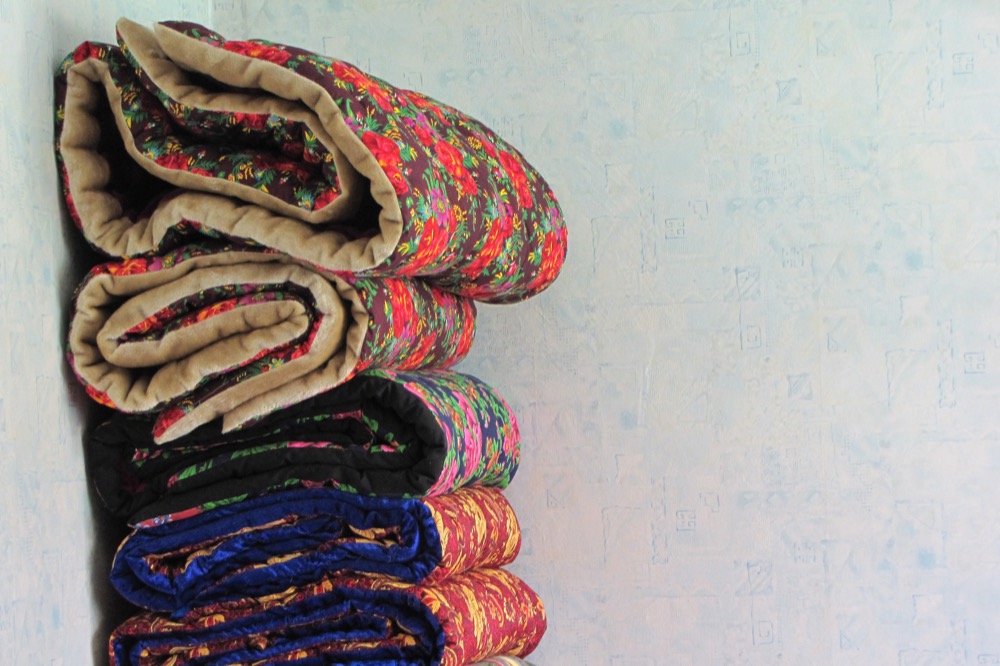Synopsis
Following Fibres is an ethnographic writing experiment, exploring the craft of storytelling as tool to convey, as well as produce, anthropological knowledge. It is a creative and open-ended engagement with forms of ethnographic writing.
The stories told, published weekly on a blog in English and German, take place in Northern Kyrgyzstan, based on ongoing fieldwork experience. Taking small events, or single encountered things as hooks for their narratives, they then fan out to ‘follow the fibres’ (material, symbolic, historical, spacial, etc.) of these encounters; to pick some broader storylines potentially nested in these singularities. Big correlations and tales emerge from the small and the chaotically empirical – so perhaps they can also be told that way:
A suitcase full of sweets and children’s clothes having traveled innumerable times between family members in Germany and Kyrgyzstan might be able to share stories about remittances, air traffic bureaucracy, nostalgia and uneven transnational mobility of people and objects. A photo album, made some decades ago, points a spotlight on thousands of Central Asian men having traveled half the globe during soviet military service. Men, remembering cities and countries they no longer can access. The traced fibres of a hand sewn blanket join up to sketch a picture of handicraft handed on, bridging generations and producing new ones. A therapeutic knee bandage can help us grasp the paths of spreading medical knowledge complexes, oddly connecting a tent in the Kyrgyz mountains with Tibet…
These are first examples. Hints to imagine what the stories themselves may look like, and hints to get to the projects two basic aims:
One is to find channels to transport anthropological insights – descriptively ethnographic and theoretical – beyond the realm of academia. Becoming an anthropologist very often feels like learning to see; also learning to ask and translate. Growing into a discipline means becoming equipped with certain words and lenses to, metaphorically sticking with the project’s title, pick and name certain fibres to be explored. Crafting condensed, but nonetheless ethnographically grounded, stories with the aid of these intellectual tools can be a way of conveying or offering the potential of these very words and lenses in an easily accessible way. Making our ideas more public is something professional anthropologists often talk about but seldom do. It is not a simple task – maybe stories can contribute.
The second aim is to use the project’s gradual unfolding as a template to muse on the written creation of knowledge itself. Both the production of academically viable knowledge and the making of stories are active, poetic and poietic practices: Specific and collectively shared ways of condensing, reducing, naming, channeling contingent and complex encounters into something new. They are ways of twisting fibres into ropes.
Accordingly, Following Fibres, can be seen as string game, juggling with two sets of rules about how to twist your ropes: story telling and ethnography. The stories are exactly that – stories. But neither are they fictive, nor are they purely, objectively representative. They are based on ethnographic fieldwork and concepts, just as much as they are based on serendipity and my individual movements. They contain generalisations and speculations, they evoke. As newly created entities they may become creative, enticing conversations, movement, ideas about contemporary Kyrgyz lifeworlds, new stories to be told, new texts to be written – similar to academically stabilized knowledge. Same same but different…
The evolvement of some particular sets of stories invites to delve into and, again, follow some grand questions on the po(i)etics of writing.
As with any experiment the final outcome is not yet to be know. But at least, there will be stories along the way, along the fibres followed.


